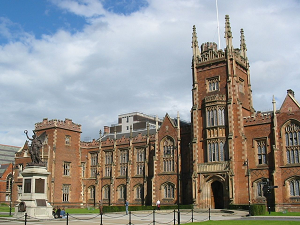
By David Young, Press Association
Brexit poses deep risks to the terms of Northern Ireland's Good Friday peace agreement, an academic report has found.
Experts from Queen's University Belfast presented the findings of their study in Brussels on Tuesday.
The report focused on the cross border elements of the agreement and its intent to foster enhanced co-operation between the UK and Ireland.
It said much of that was predicated on both countries being members of the EU.
The study was commissioned by the European Parliament's Policy Department for Citizens' Rights and Constitutional Affairs.
Co author of the report Professor David Phinnemore said "flexibility and compromise" was needed on all sides of the Brexit debate to mitigate the risks to the historic 1998 accord.
"This substantial report identifies the challenges that Brexit poses for the Good Friday agreement and hence why the Northern Ireland/Ireland dimension to Brexit has gained such prominence in phase one of the UK's withdrawal negotiations," he said.
"The effects of the UK's withdrawal from the EU extend to so much more than customs and trade arrangements."
The academic said Brexit potentially meant wide-ranging divergence between the UK and Ireland in law, trade, security, rights, policies and politics. He said this put the agreement at risk of "deep fissures".
Co-author Dr Kate Hayward said: "Any 'hardening' of the Irish border is not just a practical impediment to co-operation and economic growth but also an obstruction to the effective implementation of the agreement."
She warned the danger posed by Brexit to the agreement arose partly from the way the debate about it was being handled.
"The disagreements regarding the implications of Brexit for Northern Ireland recently aired in the media show that the biggest challenge here is not a technical one but keeping political focus on the real needs and interests of the people of Northern Ireland," she said.
"The constitutional status of Northern Ireland is not in dispute here, but its economic welfare and security is most certainly in jeopardy if politicians continue to frame the discussion as an either/or choice between Ireland and the UK."


 Mother and two children murdered in Maguiresbridge to be buried together By Jonathan McCambridge and Rebecca Black, PA
Mother and two children murdered in Maguiresbridge to be buried together By Jonathan McCambridge and Rebecca Black, PA
 Surgeon tasked with tackling waiting lists says they are a ‘national shame’
Surgeon tasked with tackling waiting lists says they are a ‘national shame’
 First Minister disappointed to not attend Belfast Pride this year
First Minister disappointed to not attend Belfast Pride this year
 Crowds expected at vigil for mother and children killed in Co Fermanagh shooting
Crowds expected at vigil for mother and children killed in Co Fermanagh shooting